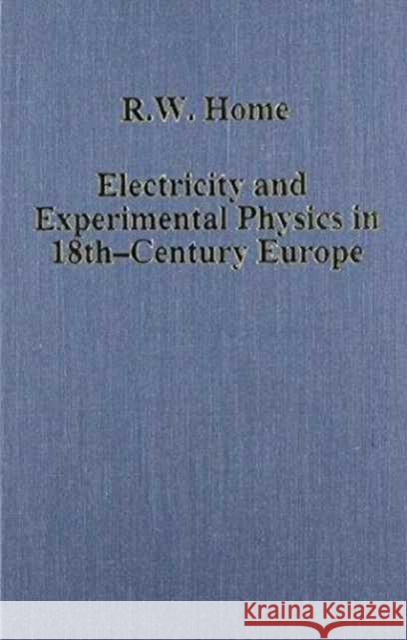Electricity and Experimental Physics in Eighteenth-Century Europe » książka
Electricity and Experimental Physics in Eighteenth-Century Europe
ISBN-13: 9780860783183 / Angielski / Twarda / 1992 / 320 str.
At the beginning of the 18th century there was no science of physics as we recognise it today; by the early years of the nineteenth century, there was. The articles in this volume are concerned with the process by which this came about. They focus, in particular, on the rise of experimental physics and the interactions between experiment, theory and mathematics in the study of electricity and, to a lesser extent, magnetism and physical optics during this period. Along the way, they provide a significant reassessment of Isaac Newtona s influence on the science of his successors. A further recurring theme is the process by which ideas were disseminated within the expanding scientific community of the day, and the manner of their reception, often in a form somewhat different from that envisaged by their first inventors, as Professor Home argues took place in the case of Franklin. The social and intellectual context of the a scientista, indeed, is the specific subject of several essays, dealing not only with England and France, but also offering new insights into the position of science in 18th-century Russia. Au debut du 18e s., la science physique telle que nous la entendons de nos jours, na existait pas; des les premieres annees du 19e s., cela na etait plus le cas. Les articles contenus dans ce volume sa interessent au procede qui a provoque ce changement. Ils sa attachent plus particulierement A la montee de la physique experimentale et A la interaction entre experience, theorie et mathematiques en ce qui concerne la etude de la electricite et, dans une moindre mesure, celle du magnetisme et de la optique physique durant cette periode. Ce faisant, les etudes fournissent une re-evaluation significative de la influence da Isaac Newton sur la science de ses successeurs. Un autre theme est celui du processus par lequel les idees etaient disseminees A la epoque au sein da une communaute scientifique en pleine expansion; le professeur Home sa interesse aussi A la faA on dont celles-ci etaient reA ues prenant une forme quelque peu differente de celle envisagee par leurs createurs, comme, selon lui, il en fut le cas pour Franklin. Le contexte social et intellectuel du a scientifiquea est specifiquement examine au cours de plusieurs articles; la auteur y traite de la Angleterre et de la France, mais offre aussi de nouvelles perspectives sur la position de la science en Russie au 18e siede."











